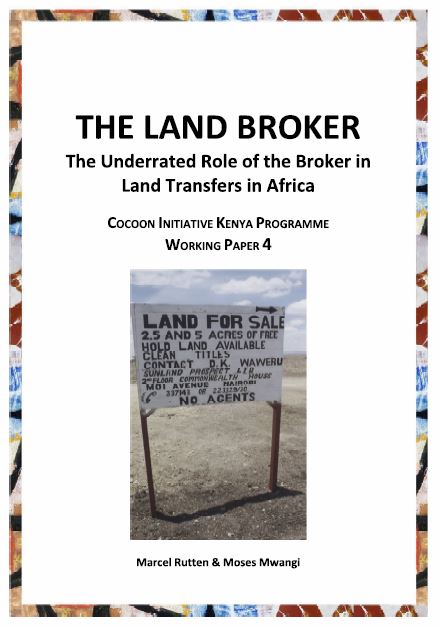The Land Broker – The Underrated Role of the Broker in Land Transfers in Africa, Cocoon Initiative Kenya Working Paper No 4.
 The opening up of new land frontiers through colonizing territories raises huge opportunities for wealth creation especially for speculators and brokers in land. Since the early colonial days, when settlers acquired vast pieces of land for free or at extremely low purchase rates on the African continent, statutory law was introduced to enable a process of colonial dispossession at the expense of the African population.
The opening up of new land frontiers through colonizing territories raises huge opportunities for wealth creation especially for speculators and brokers in land. Since the early colonial days, when settlers acquired vast pieces of land for free or at extremely low purchase rates on the African continent, statutory law was introduced to enable a process of colonial dispossession at the expense of the African population.
Current land tenure literature is mostly geared towards the various regimes of tenure, land registration, and establishing a cadastre in order to reduce transaction costs and guarantee investor confidence. The crucial role played by land brokers is rarely mentioned. Indeed, the term ‘land broker’ or equivalent is entirely missing from the land tenure lexicon. We can only guess at why this is the case. In this working paper, Marcel Rutten and Moses Mwangi share the most recent experiences in the emergence of formal land markets, and examine the underrated role of brokers in the transfer of land in Kenya.
Author(s) / editor(s)
About the author(s) / editor(s)
Marcel Rutten is a senior researcher at the African Studies Centre Leiden. His research activities concentrate on natural resource management, notably of land and water, in (semi-)arid Africa. Currently three research programmes are being carried out: conflicts over land; famine and drought coping strategies; and sustainable development of low-cost water sources (shallow wells).
Moses Mwangi is a senior lecturer at the South Eastern Kenya University (SEKU-Kitui Town campus) in the School of Water Resources Sciences and Technology, where he also chairs the Department of Hydrology and Water Resources Management.

